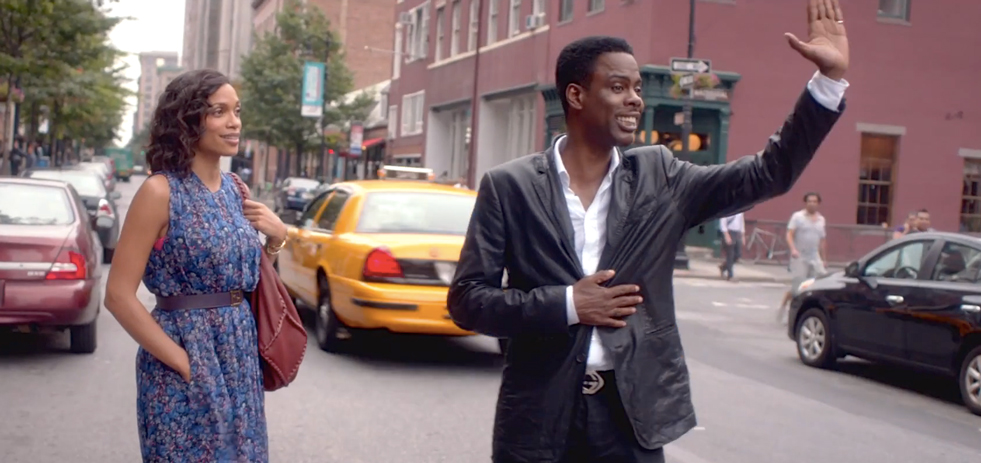
Success can be the worst thing to happen to an artist. Whatever talent had hooked their audience in initially gets buried beneath the ensuing fame and fortune, until they’re just a shadow of their former self. We see it in aging rock bands, million-selling authors and, indeed, in stadium-booking comedians, all trying to either recapture their former selves or head down a new artistic avenue, which more often than not that alienates their fans. Chris Rock throws it all into sharp relief in Top Five, a fun trip through his state of mind that also marks the first time he has directed a screenplay he wrote on his own.1 Whilst it is a thinly veiled look at his experience as a celebrity, the film avoids being an insufferable ego trip; it’s an often surprising and engaging film buoyed by a sprightly narrative.
The title refers to the characters’ top five favourite hip-hop artists, solicited to prove their credentials as a fan of the genre, but serves more deeply as a kind of litmus test for how far out of home and into Hollywoodland they’ve travelled. Rock plays Andre Allen, a comedian and actor looking back on the decades-long trail he’s blazed. He came good for himself at first, making a reputation with sell-out stand-up shows, then making bank with a trilogy of movies about a talking bear-cum-police-officer called Hammy and becoming a film star. Things have gone awry in his personal life, though, and now he’s not sure that he keep up the clownish antics people have come to expect from him. In the present day, he’s caught in two media narratives, one being his engagement to reality TV queen Erica Long (Gabrielle Union) and the other his publicity obligations for Uprize, a dire-looking piece of historical Oscar bait about a Haitian warlord which very few – even he – can feign interest in. As a salve, his agent (Kevin Hart) organises a one-on-one interview with journalist Chelsea Brown (Rosario Dawson), to be turned into a hopefully favourable feature article. The two take trips around New York with Andre’s chauffer (JB Smoove) and have a rapport so strong that he lets all sorts of hopes, fears and memories come to the surface, but things get hairy when it starts to cut both ways.
It’s easy to see the parallels in all of this to Rock’s own life, from his mega-popularity as a stand-up to his role in a wafer-light comedy franchise (voicing Marty the Zebra in the Madagascar series). The differences, however, are the most revealing. Rock puts Allen through the wringer with alcohol problems and public meltdowns, commenting on the pathology of press and tabloid coverage on a personality. Their thorny treatments of race, comedy and the confluence of the two to build a representative of wider communities are something he has brushed up against many times before, and his ambivalence towards them pervades the entire affair.2
The scenes with Dawson are the meat of the film, though, and the effect is like a tonally kaleidoscopic version of Before Sunset.3 Their ambling two-shot is a welcome motif, thanks largely to Dawson’s huge charm and chemistry with Rock. Much discussion of personal influences and philosophy takes place, but crucially, it’s buffeted by an excitable sprawl of subplots and cutaways. One particular throwback featuring Cedric the Entertainer embodies the film’s spirit: beguiling, then shocking, then hilarious in retrospect. Whatever the time period, it’s shot by Manuel Alberto Claro (Nymphomaniac) in a simple enough handheld style for Rock’s unmistakeable persona to shine through. Likewise, the editing by Anne McCabe (Margaret, Adventureland) works to punctuate gags and then ride the flow into the next sequence, as with a great stand-up routine. These and the redemption narrative energise the plot and materialise his dilemmas in exciting ways.
With the line between fiction and non-fiction comfortably blurred, Rock takes utmost pleasure in dropping big names and faces in where he sees fit. Thankfully, where he sees fit is where it comes across naturally, and whatever side of the tracks the characters land, Rock has an even-handedness towards all of them. For every panicky socialite Andre encounters (his own fiancee, a career-obsessed showrunner), there’s a success story to take decent advice from.4 When we brush against sage-proletariat syndrome in the projects, we see his less well-off friends in a knowingly simple light. His trip from suit-fitting rooms to apartment lounges and nightlife pulsates with the energy of the New York setting, and feels absolutely genuine at all times.
Far from the pretentious therapy session it might appear to be on paper, Top Five is more like a 100-minute party with a killer soundtrack (Kanye and Jay-Z have producer credits). As much as Rock has to say on the news-media complex that he has chafed with in the past, it never stoops to dour lecturing and always strides on to whatever it has in store next. By turns outrageous, melancholic, romantic and funny, it’s as though Rock had one hell of an anecdote to tell, and rather than get on stage again, this is the only way he could do it justice. Here’s hoping he has a few more where that came from.
